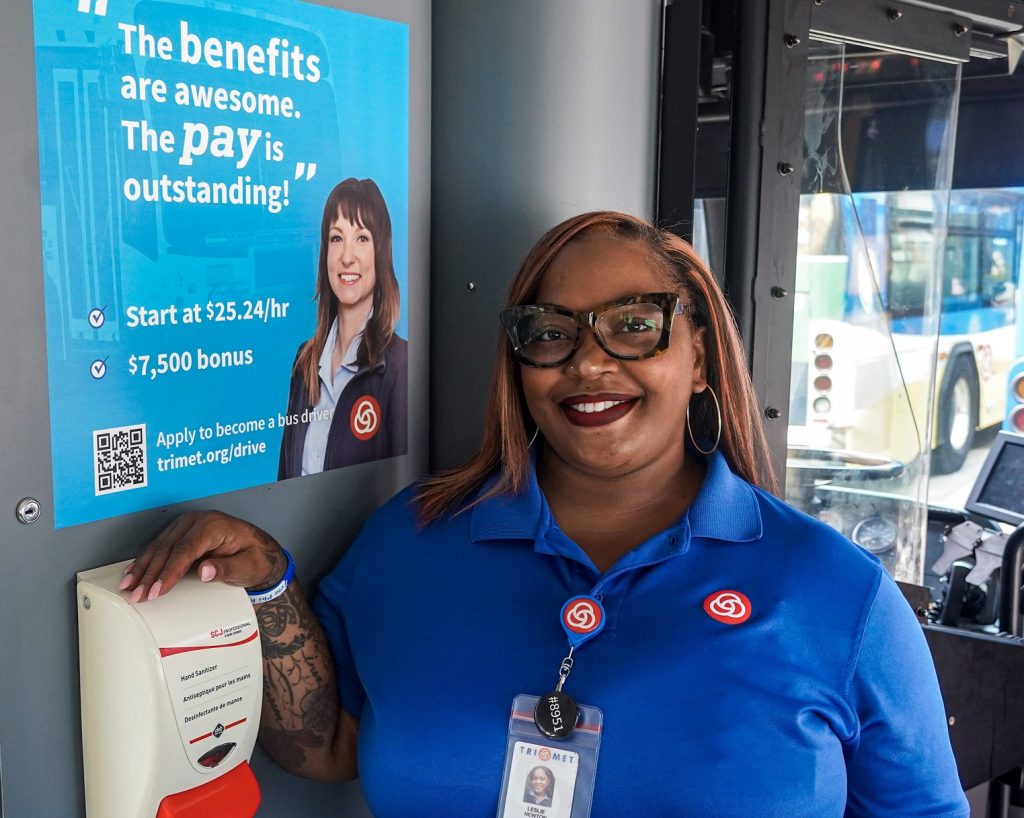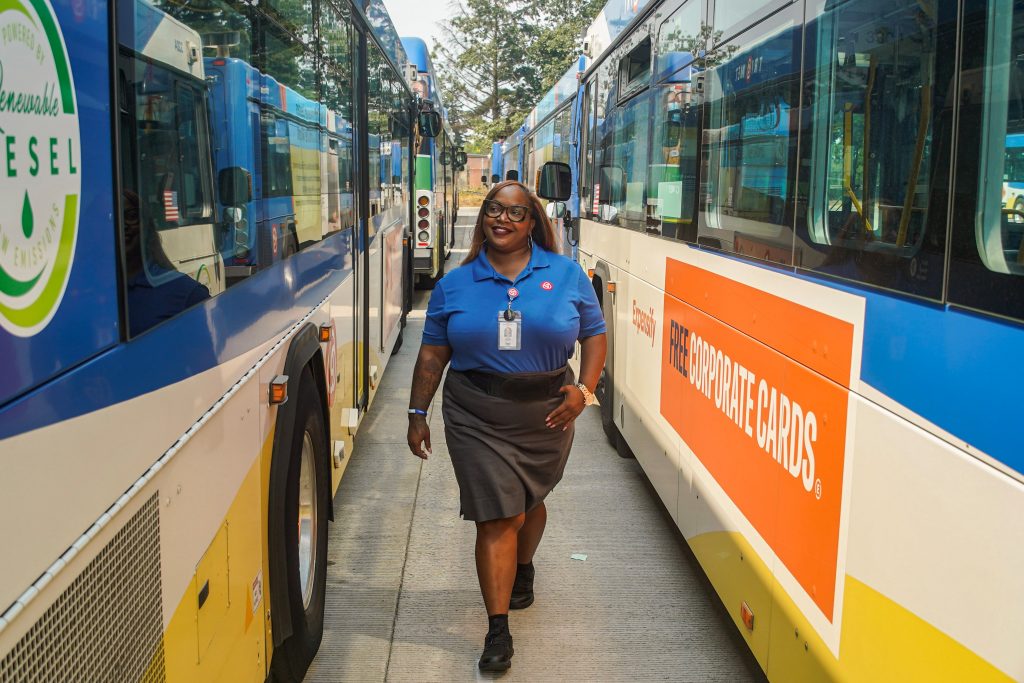From bus to rail, operators share what moving the community means for them
TriMet’s roughly 1,300 part- and full-time operators all applied to drive for TriMet for different reasons. Whether for new challenges or opportunities, or to build a better life, they’ve found a fresh start. As TriMet continues on its biggest hiring blitz in the agency’s history, we hope to have even more stories to tell in the future as we add to our roster of incredible operators.
Right now is the time. It’s easier than ever to put yourself in the driver’s seat and on the road to a starting wage of $25.24 per hour (with a contractual pay increase coming Dec. 1) and a $7,500 hiring bonus. In doing so, you’ll join a team of amazing, caring and dedicated co-workers.
Leslie Newton – bus operator
Leslie Newton remembers. The mid-summer days ticked away, and with each one a growing sense of expectation tied her in knots as she waited for that moment her life would change. It came one day in a burst when her phone sprang to life with a wild blast of sounds and vibrations. It was the call she’d been waiting for, the one from TriMet. She’d been hired as a bus operator.
Her first day would be Aug. 6, 2012. She remembers that clearly.
“When I got that call from TriMet, I cried,” Leslie says. “I cried because there was a sense of relief. It was a sense of knowing that I am now able to build a foundation and build financial stability for myself.”
Stability is important to Leslie, whose son suffers from the aftereffects of shaken baby syndrome. Her ex-partner was arrested and charged for the assault. But his trial coincided with her first year on the job, adding stress and heartache to what should have been a positive new chapter in her life. Easing her stress was a TriMet station agent who went out of their way to make sure Leslie could work around the trial.
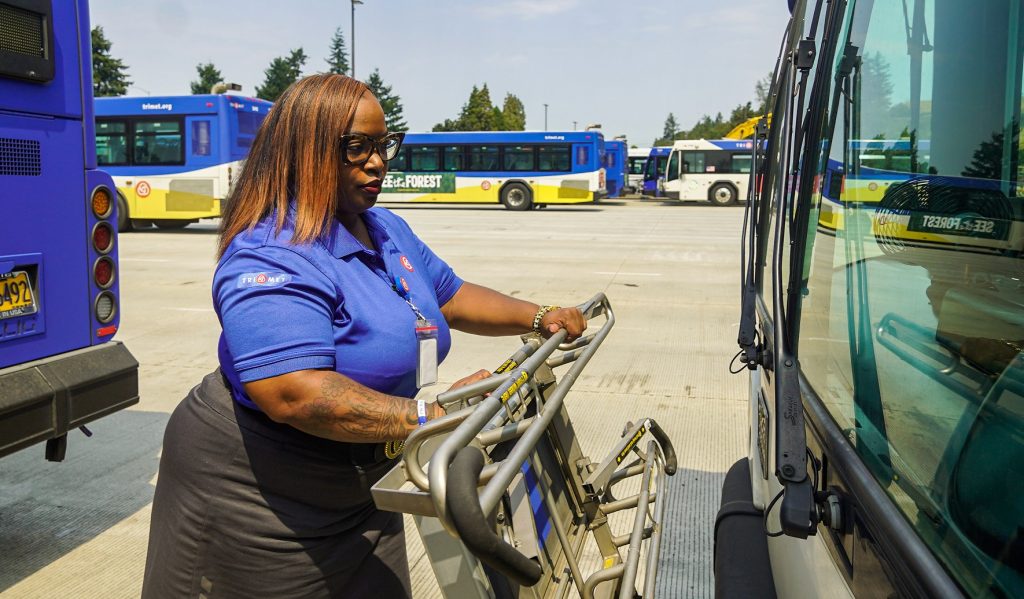
“I will always, always be grateful for that,” Leslie says. “And just for me to be where I am now, 10 years later, it’s like I have a purpose. Being a parent is a lot about sacrifice as it is.”
Before coming to TriMet, Leslie worked as a driver for the Oregon Department of Human Services while at Portland State University, taking children to supervised visits. Later she drove a school bus.
When she saw TriMet was hiring, she knew she had to apply. She says she’s now in a better season in her life. She feels strong and confident, independent and grounded. And she’s in a position to share that with her community as she takes people to their destinations.
“Because I’m a people person, I see a lot in others,” she says. “I know I can access some type of happiness in somebody’s life, even if it’s just for a second. Because we’re all going through something. We’re all fighting our own battles and demons, and we want to strive to better ourselves.”
Leslie says it’s easy for people to focus on the negative, but she chooses not to. That’s something she applies to life outside of work. When she’s not taking care of her son, she’s involved with Zeta Phi Beta, a sorority formed in the 1920s to advocate for social change through voluntary community service. It’s where she learned one of her favorite poems, “The House by the Side of the Road,” which includes one of her favorite quotes: “Let me live in a house by the side of the road… and be a friend to man.”
That quote is important to Leslie because it reminds her that real kindness is contagious. As a bus operator, she has the opportunity to spread it far and wide.
“Someone was in that house by the side of the road who was a friend to me when I grew up,” she says. “And that’s how I feel about my upbringing, and that’s how I feel about being a bus operator. Even if it’s just little things—if I can be that friend to man. I love it. It’s beautiful.”
Malayphone Keomala – part-time bus operator
After owning a restaurant for several years, Malayphone Keomala was looking for new experiences and challenges. When a friend suggested TriMet, a place he’d worked for the past 20 years, she thought about it for a moment. “‘TriMet? I can’t even drive my own car,’” she says, laughing as she recalls the conversation. “‘How can I drive a big bus?’”
But the more she thought about the benefits, good pay, flexible hours and training she’d receive, Malayphone was onboard.
“You get to greet the passengers every day and send them to the same destinations. You see them smile,” she says. “‘Thank you, driver, for your service,’ they say. It really means a lot for me because the first time, I’m not sure. Can I do this? But you know, when you get used to it, it becomes easy, and it seems like I’m not even coming to work.”

The seven weeks of paid training she received went a long way in building confidence. That’s where she—and every other TriMet bus operator—received a commercial driver’s license and experience behind the wheel.
Malayphone’s trainers believed in her. They guided her through self-doubt, building up her confidence until she knew—without any doubt—that she could take control of a 40-foot bus and drive it as comfortably as a hatchback.
“He said, ‘You can do this. I will teach you’” she says, continuing the advice her trainer gave her. “He said, ‘The only thing you need to have is customer service and be dedicated. The rest is our job.’”
Now she’s what’s known as a mini-run operator, working part-time driving different routes. The job provides flexibility to have the life she wants outside of work, she says.

For Malayphone, operating a bus is like working in a moving office. You see different parts of the region and experience the changing seasons. There’s an aspect of independence that other jobs she’s had lack. Anyone who has a knack for customer service, is safety-minded and likes variety would make a great operator, she says.
“TriMet has so much opportunity and room for us to grow,” she says. “I might become a training supervisor, or I might become a station agent, but for now I am happy with what I am doing.”
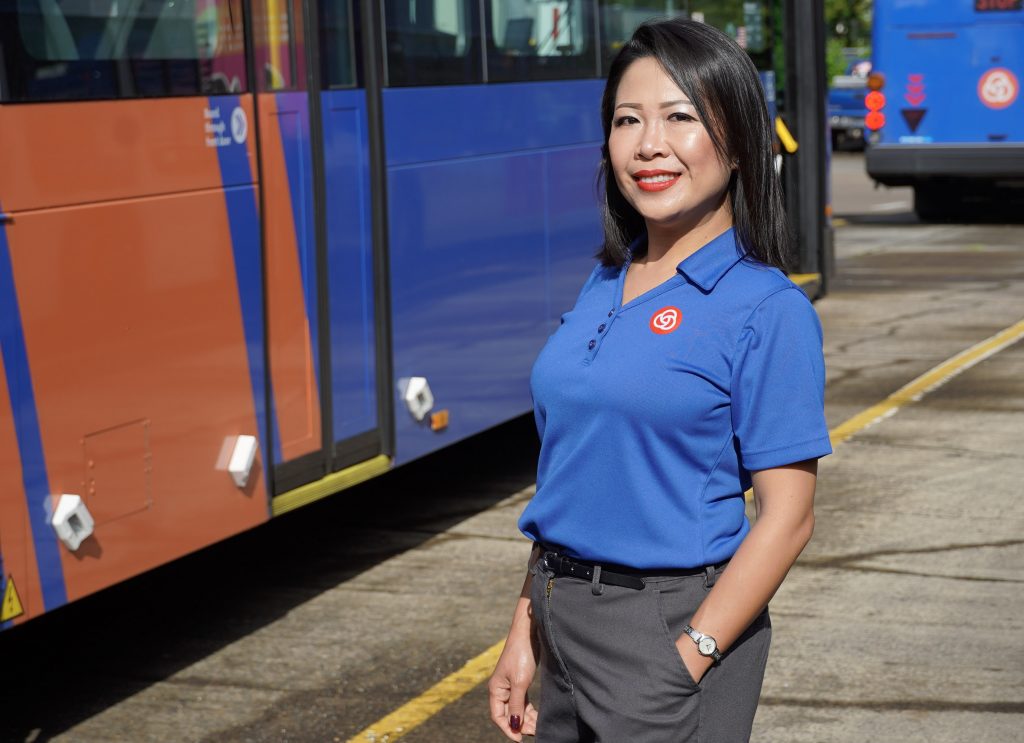
Obeary Spires, Jr. – MAX operator
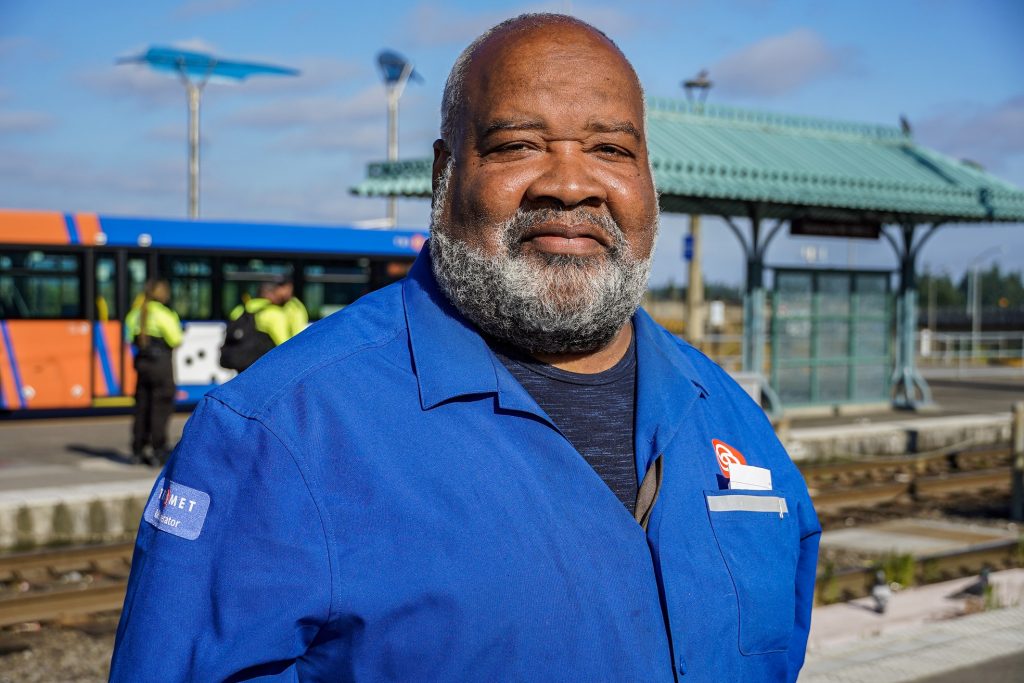
For MAX operator Obeary Spires, Jr., TriMet runs in the family. That wasn’t always the plan, however. Obeary had driven big rigs for 15 years, usually transporting cars, before the Great Recession put that on the skids.
Enter Obeary’s dad, Obeary Spires, Sr., who had a simple idea: try TriMet. Obeary’s dad had been working at TriMet for years and had even been named Operator of the Year.
Ten years ago, Obeary, Jr. took his dad’s advice, looking for consistency and career growth. Before he started, Obeary, Sr. even handed his son something meaningful from his time at TriMet–his Operator of the Year patch. This would foreshadow the recognition that Obeary, Jr. would receive.
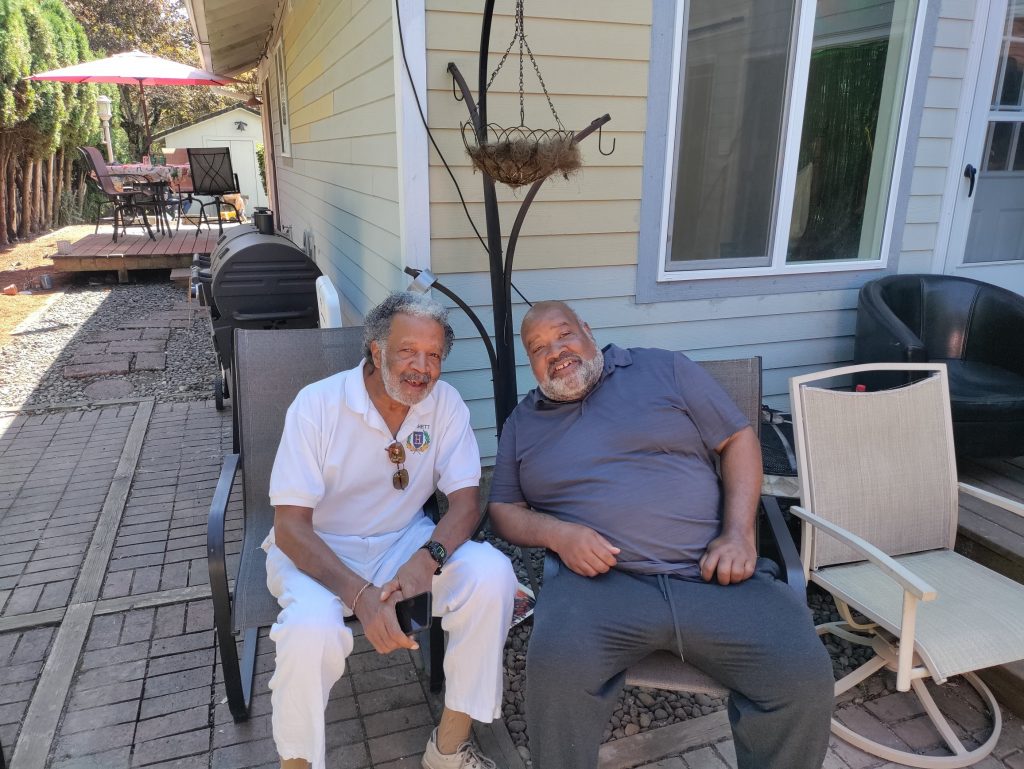
Twenty-two years after Obeary, Sr. earned Bus Operator of the Year status, Obeary, Jr. was named MAX Operator of the Year for 2022. This recognition comes from fellow operators, and it’s very meaningful to those who receive it. It also gives Obeary, Jr. a little familial satisfaction.
“He would just say, ‘Yeah, I was the operator of the year,’” Obeary says, chuckling. “And now I get to brag to him!”
Like his dad, Obeary, Jr. started as a bus operator. Unlike his dad, he decided to give MAX a try, something completely new for someone so accustomed to driving huge, wheeled vehicles.
“I wanted to drive a bus and be out with the public,” Obeary, Jr. says. “You know, just meet people. So I came over (to MAX) just to see how it was—to see if I wanted to do something new. And I liked rail. So I said, ‘Ah, I want to stay over here.’”
He still gets to interact with the public, but now he’s doing it while operating a machine very few people ever have the opportunity to master. The 11 weeks of training he received put him at ease as he made the transition from bus to rail. And now, it’s never the same, Obeary, Jr. says, and that’s how he likes it.
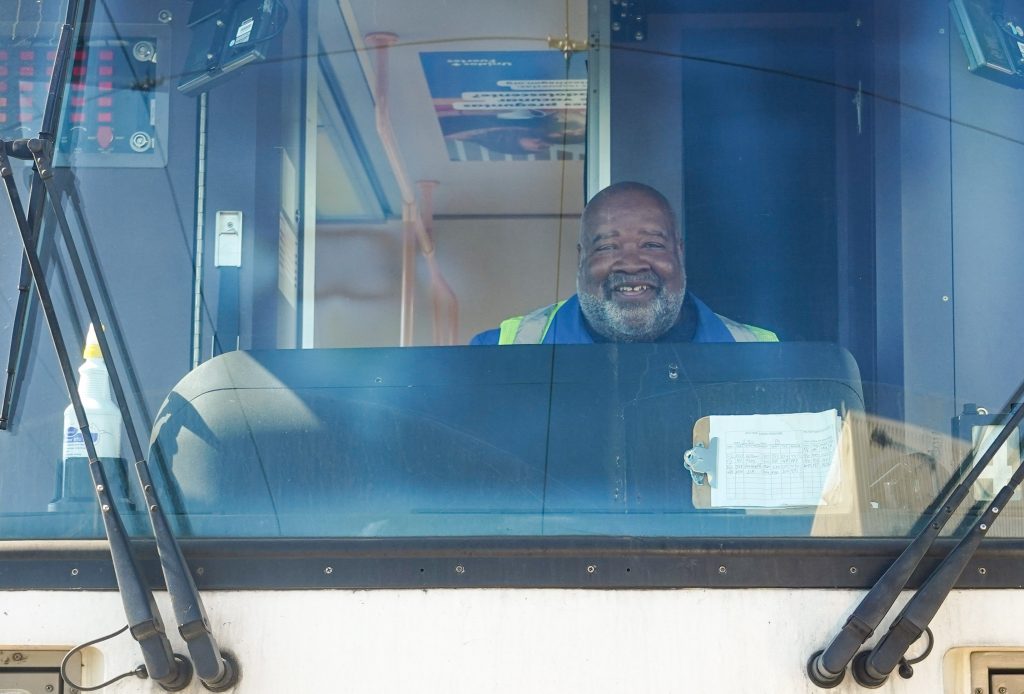
But what he especially likes is the camaraderie among operators and the smiles he brings to the faces of children.
“I really like the kids because when you come up to the kids (at a station), they like to wave, and I like to wave at them,” Obeary, Jr. says. “The best part are the kids. They love riding the train.”
Learn more and apply today!
At TriMet, we’re looking for more great operators to drive us to new heights. We strive to attract the best, and we aim to provide the tools and resources necessary to succeed in the long-term. Right now, we’re committed to adding to our team—a team that’s kept the Portland metro region moving for more than half a century by providing great pay, stellar benefits and opportunities for growth.
TriMet is offering a $7,500 hiring bonus for those joining our team as bus operators. The current starting pay is $25.24 an hour, which will increase this winter. There will be a 7.5% increase effective on December 1, 2022, and a 4% increase effective on December 1, 2023. Other benefits include:
- Medical, dental, vision, disability and life insurance plans at low or no monthly cost
- Two retirement plans, with an 8% agency base pay contribution to employee’s 401a
- One week of paid vacation and up to 40 hours sick leave in the first year of employment, with paid time off increasing over time
- Health and dependent care spending accounts
- Access to our Employee Assistance Program with mental health and counseling services, legal assistance, financial coaching and home ownership programs
- Annual transit pass (valued up to $1200) for employee and eligible family members
- 24-hour access to five exclusive, low-cost, on-site fitness centers
- Representation by Amalgamated Transit Union (ATU) 757
TriMet bus operators also qualify for MAX operator training after successfully completing bus operator training. trimet.org/driveforus.
